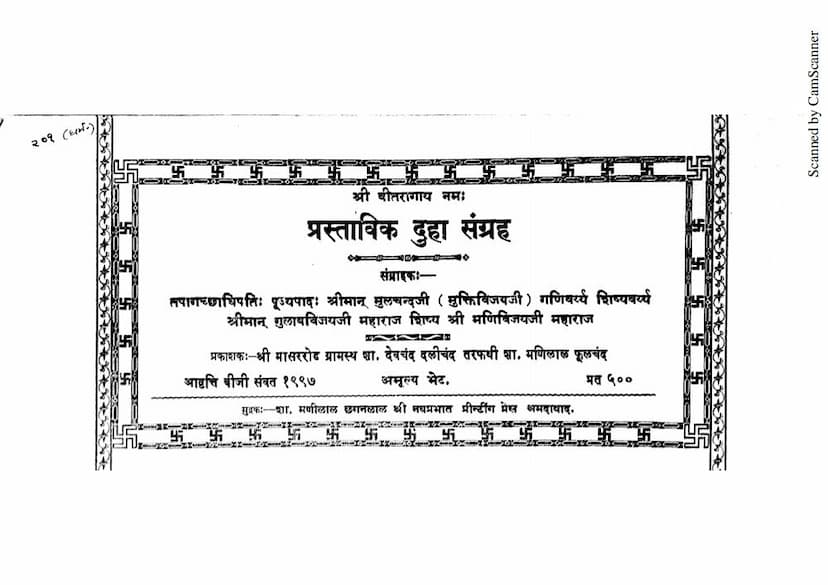Prastavik Duha Sangrah
Added to library: September 2, 2025

Summary
The provided text is a comprehensive collection of Duhas (couplets or short verses) in Gujarati, compiled by Muni Manivijayji. Titled "Prastavik Duha Sangrah," it is published by Devchand Dalichand. The collection contains a vast number of Duhas, numbered from 1 to 723, covering a wide array of themes relevant to Jain philosophy, ethics, worldly wisdom, and social commentary.
Here's a breakdown of the content and themes:
-
Compilation and Authorship: The book is compiled by Muni Manivijayji, a disciple of Gulabvijayji Maharaj, who was a disciple of Tapa Gachhadhipati Shriman Mulchandji (Mukti Vijayji) Ganivarya. The publication is a second edition from Samvat 1997 (1940-1941 CE), sponsored by Shravak Devchand Dalichand from Masar Road village.
-
Purpose and Content: The preface on page 2 mentions that Muni Manivijayji has authored several books on the path to liberation, the means to achieve Jainism, beneficial advice for aspiring souls, and prohibition of the seven deadly sins. This Duha Sangrah is presented as a collection of wisdom and moral teachings.
-
Thematic Range of Duhas: The Duhas cover a vast spectrum of human experience and ethical teachings, often delivered with a moralistic or cautionary tone. Key themes include:
- Ethics and Morality: Virtues like generosity, truthfulness, humility, contentment, patience, forgiveness, compassion, and the importance of good conduct are frequently highlighted.
- Prohibition of Vices: The verses strongly condemn sins and negative behaviors such as greed, anger, pride, deceit, theft, adultery, intoxication (smoking, drinking), slander, attachment to worldly possessions, and vanity.
- Worldly Wisdom and Observations: Many Duhas offer practical insights into human nature, societal interactions, and the transient nature of life. They comment on the consequences of actions, the differences between people, the folly of certain behaviors, and the importance of discerning wisdom.
- Spiritual Guidance: While not strictly theological, many Duhas touch upon spiritual principles, the importance of righteous actions, the nature of karma, the impermanence of the body, and the pursuit of spiritual liberation.
- Social Commentary: The verses sometimes critique societal norms, hypocrisy, and the behavior of various professions or social groups.
- Riddles and Puzzles: A significant portion of the later Duhas (especially from page 37 onwards) are presented as riddles or word puzzles, often asking "What is it?" or "Tell me, disciple, what is it?" This section seems to be a separate category within the collection, testing the reader's wit and understanding.
-
Style and Language: The Duhas are written in a simple yet profound Gujarati, employing metaphors, similes, and allegories to convey their messages effectively. The language is accessible, making the teachings relatable to a broad audience.
-
Key Messages:
- The importance of right conduct (dharma) over worldly possessions and pleasures.
- The law of karma – actions have consequences.
- The impermanence of life, youth, and wealth, urging readers to focus on spiritual pursuits.
- The destructive nature of vices and the constructive power of virtues.
- The value of discerning association and the dangers of negative company.
- The significance of self-reflection and controlling one's desires and emotions.
In essence, "Prastavik Duha Sangrah" is a rich repository of ethical, philosophical, and practical wisdom presented in the accessible and memorable format of Duhas, aiming to guide individuals towards a virtuous and spiritually fulfilling life within the Jain tradition. The riddles section adds an interactive and intellectual dimension to the collection.